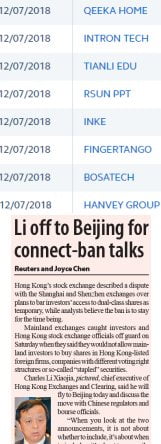Hong Kong’s economic policymakers largely serve the needs of established, especially local, business interests. Thus we avoid change. As one author notes, the big tycoons of 20 or 30 years ago are the same big tycoons (well into their 80s) of today. Despite constant talk of innovation and tech and creative blah-blah, officials’ actions are strictly ‘more of the same’.
The policy is simple. Pack more tourists in, host more conferences, build more pointless white elephants, list more obscure Mainland companies. Cram more stuff in, skim off the top, repeat.
And up the rents, obviously.
In fairness to our bureaucrats bleating empty slogans about tech – with hot money pouring in desperate for intermediaries’ tender loving care, why should Hong Kong do anything different or original, or focus on economic quality rather than quantity?
Strolling around Exchange Square/IFC Mall early one morning last week, I noticed an above-average number of youngish, smartly dressed men and a few women who looked like they didn’t quite belong. They were in small and medium-size groups and had ID cards clipped to their jackets. They chattered excitedly in Mandarin. They took group selfies in front of Elizabeth Frink’s sculptures and Hong Kong Lands’ skyscrapers. One delegation took up half the tables in Pret a Manger, comparing exotic pastries and yogurts as bumpkins from across the border would have in the 80s.
 It was a mega-IPO day. So many companies were launching on the Stock Exchange that the institution apparently ran out of the tacky gongs it uses as opening-bell props for listees’ PR photos. (It was Thursday, when eight companies were listed, including the oh-so digital-sounding Fingertango.)
It was a mega-IPO day. So many companies were launching on the Stock Exchange that the institution apparently ran out of the tacky gongs it uses as opening-bell props for listees’ PR photos. (It was Thursday, when eight companies were listed, including the oh-so digital-sounding Fingertango.)
A few days before, Xiaomi had done its IPO. The debut was a sort-of flop, owing to over-hyping, plus trade-war fears. This was embarrassing for the (government-run self-regulating monopoly) HKEx stock exchange, which had changed the listing rules to attract trendy ‘unicorn’ companies by accommodating dual-class listings, despite objections that this is simply the cram-more-stuff-in approach – or to use the technical terminology of a noted expert, ‘about attracting any crappy company we can by dismantling shareholder rights’.
Like most Hong Kong cram-more-stuff-in-and-skim industries, the stock market assiduously shoe-shines Beijing. Specifically, it grovels for favours in the guise of ‘helping internationalize the yuan’, or whatever baloney (Belt and Road!) hits the Communist Party’s spot. One supposed win-win concession was the Stock Connect, allowing Mainlanders to buy Hong Kong-listed stocks, kind of.
Now, in an extra kick-in-the-teeth embarrassment, Beijing is forbidding Mainlanders from investing in Xiaomi via this much-lauded visionary channel. HKEx are putting a brave face on it. Chinese officials are unhappy that companies like Xiaomi aren’t listing on the Mainland, and are already jittery about possible bigger economic-mayhem looming. But officially, they are declaring Xiaomi stock off-limits to domestic investors on those ‘crappy company/shareholder rights’ grounds. Which is of course doubly humiliating to HKEx and their bureaucrat buddies.
Traditionally, Hong Kong has sometimes barred Mainland products (veg and fish) on the grounds that they are toxic to consumers. Now it’s the other way around – China rejects Hong Kong’s low standards.
God forbid this city might have to diversify into productive value-creating economic activity one day.
